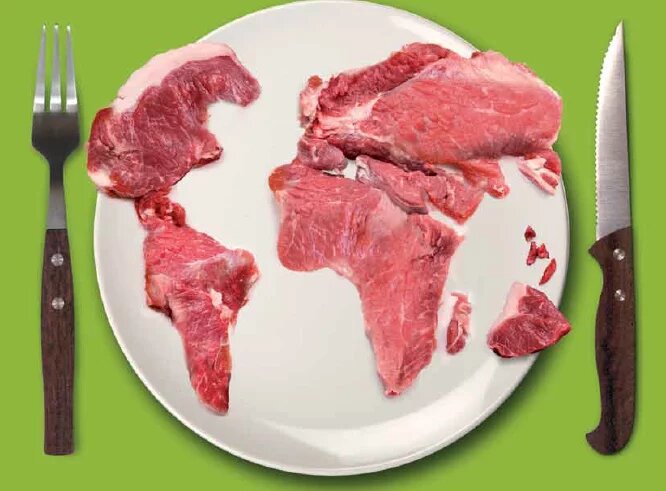
Press release
Berlin: The Heinrich Böll Foundation, Le Monde Diplomatique and Friends of the Earth Europe / BUND launch the new Meat Atlas 2014, an analysis of the big business of the global meat trade.
The farmers of 2050 will have to produce an extra 150 million tonnes of meat to satisfy our global hunger. To reach a yearly total of 470 million tonnes, more land will need to be set aside to grow animal feed. In fact, farmers will be giving their animals 500 million tonnes of soy feed in 2050. Nearly double the amount they use per year today.
Barbara Unmüßig, President of the Heinrich Böll Foundation, criticises today’s highly industrialised meat production system: "Modern European and American abattoirs have grown out of all proportion. Here in Germany we kill 735 million animals per year. Whilst the US company, Tyson Foods, alone slaughters more than 42 million animals a week. This cannot be a healthy method of farming."
The real boom in demand is in Asia amongst the fast-growing middle classes. "Asia is quickly imitating the western model of highly industrialised meat production with the inevitable food scares, misuse of antibiotics, growth hormones and nitrogen pollution," says Unmüßig.
Keeping European troughs filled with soya already eats up 16 million hectares of land. "We’ll have soaring land and food prices as we grow more animal feed to produce a further 150 million tonnes of meat per year. It’s the poor who’ll pay the price of this global hunger for meat. They’ll be pushed off their land and will find it hard to afford food," says Unmüßig.
BUND agricultural expert, Reinhild Benning, warns of the huge environmental and social impact of raising the amount of animal feed we produce: “The consequences will be disastrous. 70% of all cultivated land is already used to grow animal feed. Arable land is scarce, rainforests are disappearing, soil and water are polluted with pesticides and the prices of basic foodstuffs are rising. In South America there are real health risks due to the extensive use of the toxic weed killer, Glyphosate, on genetically modified soy crops.” The good news here was that Germans reduced their yearly meat consumption last year by 2 kg per person on average.
What kind of food do we want on our plates?
Meat treated with growth hormones may soon be entering the EU, as a result of the current trade talks between Europe and the US (Transatlantic Trade and Investment Partnership), the organisations warn. "Our high food and farming standards must not be undermined by this free trade deal," says BUND chairman, Hubert Weiger. In protest, BUND will hold a rally at Berlin’s "Green Week" on January 18th, calling for consumer and animal-friendly agricultural policies.
"Germany and Europe have banned growth hormones in animal feed for good reasons. The health risks for children and young people are far too great. If the free trade deal sways in favour of the multinationals and lifts the restrictions, it’s our health and the health of our animals at stake," says Weiger.
Download the Meat Atlas here:
www.boell.de/meat-atlas
www.foeeurope.org/meat-atlas
The material in the Meat Atlas is available for use under a Creative Commons license.
Please attribute all the texts and graphics as follows: CC-BY-SA Heinrich Boell Foundation, Friends of the Earth Europe.
Turn angry birds into happy chickens with the new Fleisch-App!
Discover how meat-savvy you really are and test your knowledge of the meat industry and the environmental impact of global meat eating. Every correct answer frees unhappy chickens from their cages! The App is currently only available in German. You can download it here:
www.boell.de/fleischatlas
Press contacts:
Heinrich-Böll-Stiftung
Ramona Simon, Press Officer
Tel. 030 285 34 202, simon@boell.de
BUND / Friends of the Earth Germany
Rüdiger Rosenthal, BUND-Pressesprecher
Tel. 030-27586-425/-464, Mobile: 0171-8311051, presse@bund.net, www.bund.net
Friends of the Earth Europe
Sam Fleet, communications officer
Tel. +32 2893 1012, Mobile: +32 470 072 049, samuel.fleet@foeeurope.org